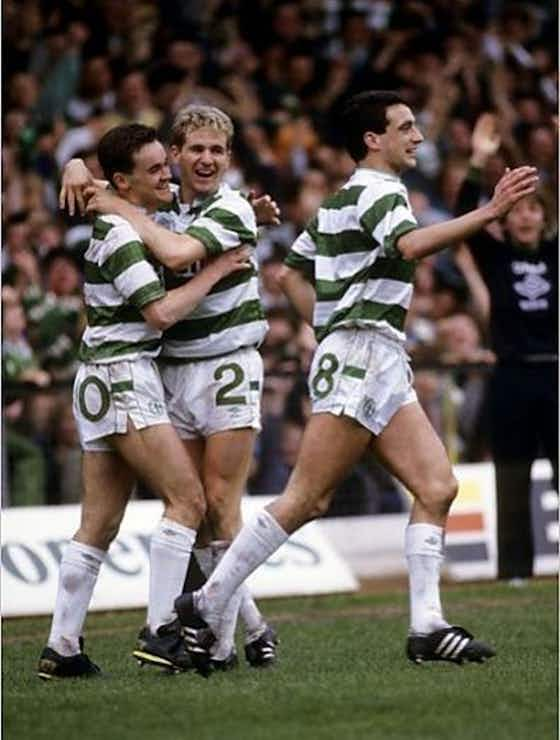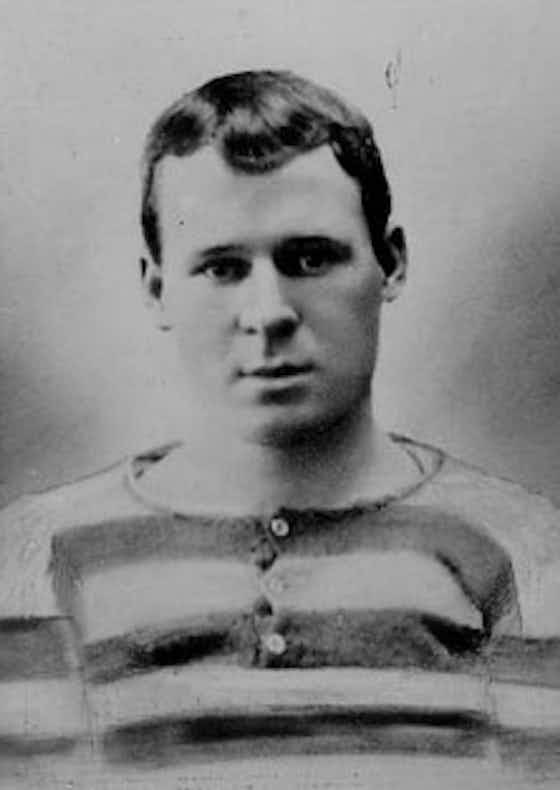The Celtic Star
·30. November 2024
Celtic and St Andrews Day and a wee toast – Slainte mhaith!

In partnership with
Yahoo sportsThe Celtic Star
·30. November 2024


Andy Lynch scores the only goal of the 1977 Scottish Cup Final against Rangers at Hampden. Photo The Celtic Wiki
Most obviously, this includes players named Andrew – although surprisingly not as many Celts as you might think have had this name – but there have been other links too.
For some reason, many of the most prominent Celtic Andrews have been forwards. Arguably the most significant – certainly in the era following World War Two – has been Andy Walker.

23/04/88 – Celtic 3 Dundee 0. Celtic goalscorer Andy Walker (left) is congratulated by team-mate Chris Morris. Photo The Celtic Wiki
In recent times, some fans have taken issue with Walker in his role as a TV pundit, but he still has a major place in Celtic history.
He arrived at Celtic from Motherwell in 1987. Walker went on to have a major impact, finishing top scorer as the Bhoys claimed a centenary league and Cup double. In particular, his Scottish Cup semi-final winner versus Hearts was essential to claiming that season’s cup, as well as being one of 1988’s most memorable moments.
Walker left Celtic in 1991 but returned to Parkhead from 1994 until 1996, playing his part in the 1995 Scottish Cup triumph.

Andy Payton Glasgow Celtic FC 21 September 1992 Photo Mary Evans Allstar – David Gadd
Another forward from that era was the popular Andy Payton. Like so many players in the early-1990s, he didn’t enjoy much success. However his 15 goals in 36 games was a good return. And the decision to replace him with Wayne Biggins has always remained a bizarre decision.

Celtic star Andy McAtee. Photo The Celtic Wiki
A much more important forward – though often little known – was Andy McAtee.
The Croy man played for the Celts more than 400 times between 1910 and 1924, apart from his time serving as a gunner in World War One.
He won ten major trophies with Celtic, scoring 69 goals in the process. In fact, he is joint eighth in Celtic records for scoring in successive seasons, doing so 14 times.
Apart from forwards, other Andrews have worn the green-and-white.
Andy Lynch was a sometime left-winger or left-back who had a transnational career, playing not only in Scotland but also the USA and Canada.
He spent seven years at Parkhead, winning various competitions. One prominent moment came as part of the ‘Ten men won the League’ game when the Celts beat Rangers 4-2 to claim the 1979 title.

4-2 delight for Danny McGrain and Andy Lynch in May 1979. Photo The Celtic Wiki
And, on a personal level, he scored the only goal as Celtic beat the Ibrox side to claim the 1977 Scottish Cup.
Andy Ritchie was another notable man to have that first name and pull on the Hoops.

Andy Ritchie – Photo The Celtic Wiki
An attacking midfielder, he spent three years at Celtic in the mid-1970s, although is certainly best known for his time at Morton after leaving Celtic. In particular, his track record of helping the Greenock men challenge Celtic made him often a thorn in the Bhoys’ side!
There have been other Andrews at Celtic too, often making only fleeting appearances.
Andy McCondichie was a young goalkeeper who played once for Celtic in 1998. Due to a goalkeeping crisis he almost appeared in the famous 5-1 victory over Rangers in November 1998, but Tony Warner was signed instead.
As well as Andrew as a first name, numerous other Celts have had variations of this title. One that might give nightmares to fans of a certain age is Ian Andrews.
The English goalkeeper was at the club for just over a year in the late-1980s. Unfortunately, his appearances would perhaps be better suited to a discussion of Halloween rather than St Andrew’s Day.
Signed from Leicester City, he started off well. However, a 5-1 hammering at Ibrox in August 1988 set the tone for his time and he had few chances after that. In fact, a year later he was sent off at the same ground in a reserve match.
Much happier Andrew memories belong to people with the German equivalent of Andrew as their title: Andreas.

Celtic versus Dundee United Football 22nd November 1997Scottish football premier league Parkhead final score 4 0Andy Thom celebrates after opening scoring with a penalty kick goal
The first of these, Andreas Thom, was a hugely popular and skilful forward in the 1990s. Signed by Tommy Burns for more than £2 million, he spent almost three years at the club, including winning the 1995 Scottish Cup.
Thom also claimed a League Cup and title medal, although his ability deserved more in the way of trophies. He is one of a small number of players to have represented more than one international country, playing for East Germany and the reunified Germany too.
Ten years after Thom departed Parkhead, another German Andreas walked in the door. In this case, it was defender Andreas Hinkel.

Celtic defender Andreas Hinkel (Photo by Stu Forster/Getty Images)
Like his namesake, he was a German internationalist who spent three years in Glasgow’s east end. Hinkel won the League and League Cup with Celtic, his most celebrated moment possibly the final day title triumph in 2008 when the Bhoys won the League at Tannadice.
Although many Celts have been called Andrew, there are other Celtic and Andrew connections.
For one thing, the Bhoys have actually played in the Scottish town of St Andrews. Celtic fans will know that the Bhoys have often gone to Fife, and players such as John Thomson have hailed from the kingdom.
However in 1897, Celtic were participating in a tour of Scotland, and went to Kinness Park in the town. The Glasgow men beat Ancient City Athletic 4-1 in a friendly game.
One St Andrews match that has much less positive memories came during Tommy Burns’ time as manager. In July 1995, just months after winning the Scottish Cup, the Hoops travelled to Birmingham for a so-called friendly, although the reception they received in the Midlands made a mockery of that word.
Playing at Birmingham City’s home ground of St Andrews, Celtic lost the game 1-0. However, no-one really cared about this. What was a problem was the organised right-wing violence which saw Celtic fans subjected to attacks throughout the day. It even witnessed Birmingham chief executive Karren Brady enter her own crowd to remonstrate with local fans.
On a smaller level, there are other Bhoys’ connections with St Andrews. For one thing, St Andrew’s Cathedral in Glasgow has been host to numerous Celtic funerals, including defender Jim Brogan, one of the heroes of Celtic’s 1970 European Cup Final run.

CELTIC V ATLETICO MADRID EUROPEAN CUP SEMI-FINAL 1974 AT PARKHEADL/R DAVIE HAY,JIM BROGAN ,KENNY DALGLISH & HARRY HOOD (11)PIC ERIC MCCOWAT
In addition to all of this, there have been the fixtures that Celtic have played on St Andrew’s Day, some of which are iconic moments in the club’s history.
Of all of these, surely the most important came in 1966. On that day, Celtic went to France and beat Nantes 3-1. It was a game that took Celtic on the road to glory in Lisbon in 1967.
And in 1997, the Celts celebrated at Ibrox when they beat Dundee United 3-0 to win the League Cup. Not only did this match give Wim Jansen his first Celtic trophy, it was also the catalyst to win Celtic’s first title in a decade, stopping Rangers’ own ten-in-a-row attempt.
So there are lots of Celtic history linked to Saint Andrew. Although there is one downside to connecting the Hoops with the saint. As well as being Scotland’s patron saint – and other countries like Greece and Russia – he’s also patron saint of the Rangers.
But in that case, it’s the US Army Rangers, rather than new sides from the Ibrox area, so something that can be overlooked.
The most important Andrew in Celtic’s history is better known by another name. The club’s founder – Brother Walfrid – was originally called Andrew Kerins. His work in tackling poverty in Glasgow’s east end led to him establishing Celtic.

A detailed view of the statue of Brother Walfrid, Founder of Celtic, prior to the Cinch Scottish Premiership match between Celtic FC and St. Mirren FC at Celtic Park on January 18, 2023. (Photo by Ian MacNicol/Getty Images)
If you are raising a dram – or any other drink – to toast St Andrew’s Day, Slainte mhaith!
Matthew Marr
Follow Matthew on Twitter @hailhailhistory
Click on cover to order a hardback copy
Matthew’s debut Celtic book titled ‘The Bould Bhoys – Glory to their name’ was published by Celtic Star Books last year and is available to order HERE. This brilliant book is also available on Amazon Kindle for just £3.49 and includes all photo sections that appear in the hardback edition.
Matthew Marr with his debut Celtic book, Glory to their name, which tells the story of Celtic’s first ever title win. Photo The Celtic Star
More Stories / Latest News






























































